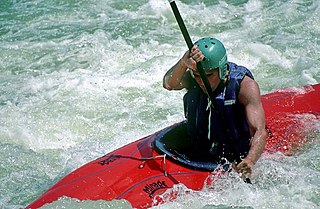
A kayak is a small, narrow human-powered watercraft typically propelled by means of a long, double-bladed paddle. The word kayak originates from the Inuktitut word qajaq. In British English, the kayak is also considered to be a kind of canoe.

Kayaking is the use of a kayak for moving over water. It is distinguished from canoeing by the sitting position of the paddler and the number of blades on the paddle. A kayak is a low-to-the-water, canoe-like boat in which the paddler sits facing forward, legs in front, using a double-bladed paddle to pull front-to-back on one side and then the other in rotation. Most kayaks have closed decks, although sit-on-top and inflatable kayaks are growing in popularity as well.
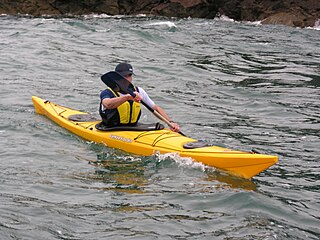
A sea kayak or touring kayak is a kayak used for the sport of paddling on open waters of lakes, bays, and oceans. Sea kayaks are seaworthy small boats with a covered deck and the ability to incorporate a spray deck. They trade off the manoeuvrability of whitewater kayaks for higher cruising speed, cargo capacity, ease of straight-line paddling (tracking), and comfort for long journeys.
A folding kayak is a direct descendant of the original Inuit kayak made of animal skins stretched over frames made from wood and bones. A modern folder has a collapsible frame made of some combination of wood, aluminium and plastic, and a skin made of a tough fabric with a waterproof coating. Many have integral air chambers inside the hull, making them virtually unsinkable.

Whitewater kayaking is an adventure sport where a river is navigated in a decked kayak. Whitewater kayaking includes several styles. River running; where the paddler follows a river and paddles rapids as they travel. Creeking usually involving smaller, steeper, and more technical waterways. Creek boats tend to be short but high volume to allow for manoeuvrability while maintaining buoyancy. Slalom requires paddlers to navigate through "gates". Slalom is the only whitewater event to be in the Olympics. Play boating involves staying on one feature of the river and is more artistic than the others. Squirt boating uses low-volume boats to perform special moves in whitewater features.

The International Canoe Federation (ICF) is the umbrella organization of all national canoe organizations worldwide. It is headquartered in Lausanne, Switzerland, and administers all aspects of canoe sport worldwide. 157 countries are affiliated with the ICF after seven national federations were added at the 2008 ICF Congress in Rome.
Paddle UK is a national governing body in the United Kingdom for canoeing, kayaking and other paddlesports such as standup paddleboarding. Established in 1936 as the British Canoe Union, it federalised in 2000 to become the umbrella organisation for the home nation associations in Scotland, Wales and Northern Ireland. In 2015 it took on the name British Canoeing and amalgamated the former British Canoe Union, Canoe England and GB Canoeing. In March 2024, British Canoeing changed their name to Paddle UK.

Kayak fishing is fishing from a kayak. The kayak has long been a means of transportation and a means of accessing fishing grounds. Kayak fishing has gained popularity in recent times.

A war canoe is a watercraft of the canoe type designed and outfitted for warfare, and which is found in various forms in many world cultures. In modern times, such designs have become adapted as a sport, and "war canoe" can mean a type of flatwater racing canoe.
Johnson Outdoors Inc. produces outdoor recreational products such as watercraft, diving equipment, camping gear, and outdoor clothing. It has operations in 24 locations worldwide, employs 1,400 people and reports sales of more than $315 million. Helen Johnson-Leipold, one of Samuel Curtis Johnson, Jr.'s four children, has run the company since 1999.
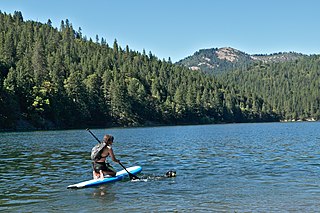
Paddleboarding is a water sport in which participants are propelled by a swimming motion using their arms while lying or kneeling on a paddleboard or surfboard in the ocean or other body of water. Paddleboarding is usually performed in the open ocean, with the participant paddling and surfing unbroken swells to cross between islands or journey from one coastal area to another.
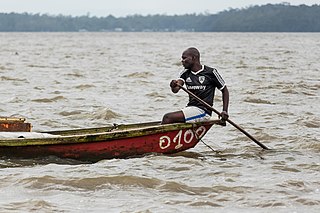
Paddling, in regard to waterborne transport, is the act of propelling a human-powered watercraft using at least one hand-held paddle. The paddle, which consists of one or two blades joined to a shaft, is also used to steer the vessel via generating a difference in propulsion between the two sides of the watercraft. The paddle is not connected to the boat, unlike in rowing where the oar is attached to the boat.
Lifetime Products Inc. is a privately owned company founded in 1986. Its main products are blow-molded polyethylene folding chairs and tables, picnic tables, home basketball equipment, sheds, coolers, kayaks and paddleboards, and lawn and garden items, along with OEM steel and plastic items from other companies.

Standup paddleboarding (SUP) is a water sport born from surfing with modern roots in Hawaii. Standup paddleboarders stand on boards that are floating on the water and use a paddle to propel themselves through the water. The sport was documented in a 2013 report that identified it as the outdoor sporting activity with the most first-time participants in the United States that year. Variations include flat water paddling, racing, surfing, whitewater SUP, yoga, and fishing.
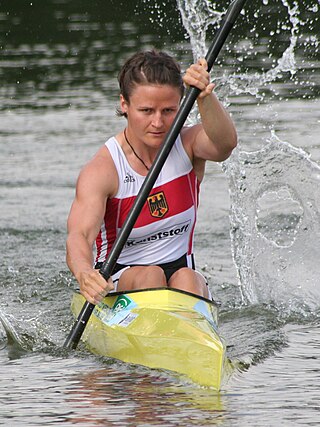
Sprint kayak is a type of canoe sprint held on calm water. The paddler is seated, facing forward, and uses a double-bladed paddle pulling the blade through the water on alternate sides to propel the boat forward. Kayak sprint has been in every summer Olympics since it debuted at the 1936 Summer Olympics. The sport is governed by the International Canoe Federation.
Corran Descy Addison is a slalom canoeist, whitewater kayaker, surfer and surfboard designer. He is now based in Montreal, Quebec.

Canoeing – recreational boating activity or paddle sport in which you kneel or sit facing forward in an open or closed-decked canoe, and propel yourself with a single-bladed paddle, under your own power.

Human-powered watercraft are watercraft propelled only by human power, instead of being propelled by wind power or an engine.
Roray Kam is a surfer, a multiple-time winner of longboard surfing competitions and an early participant in stand up paddle boarding in South Florida. He is a surfing coach and the founder of RK Ocean Gear, and in 2013 resides in Fort Lauderdale, FL and works for the Broward County Sherriff's Office. Kam has hosted a number of Stand Up Paddleboard (SUP) events and races.













